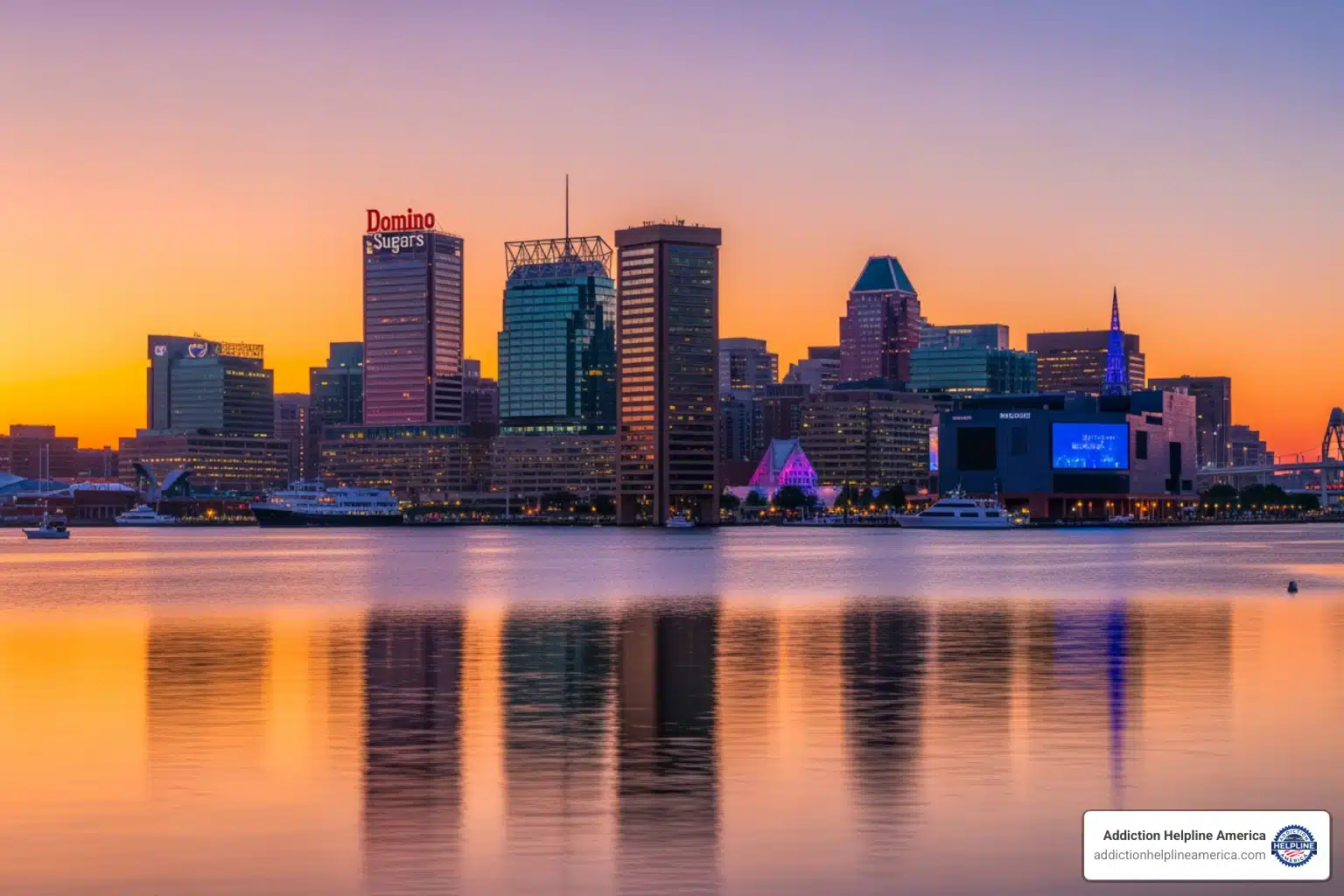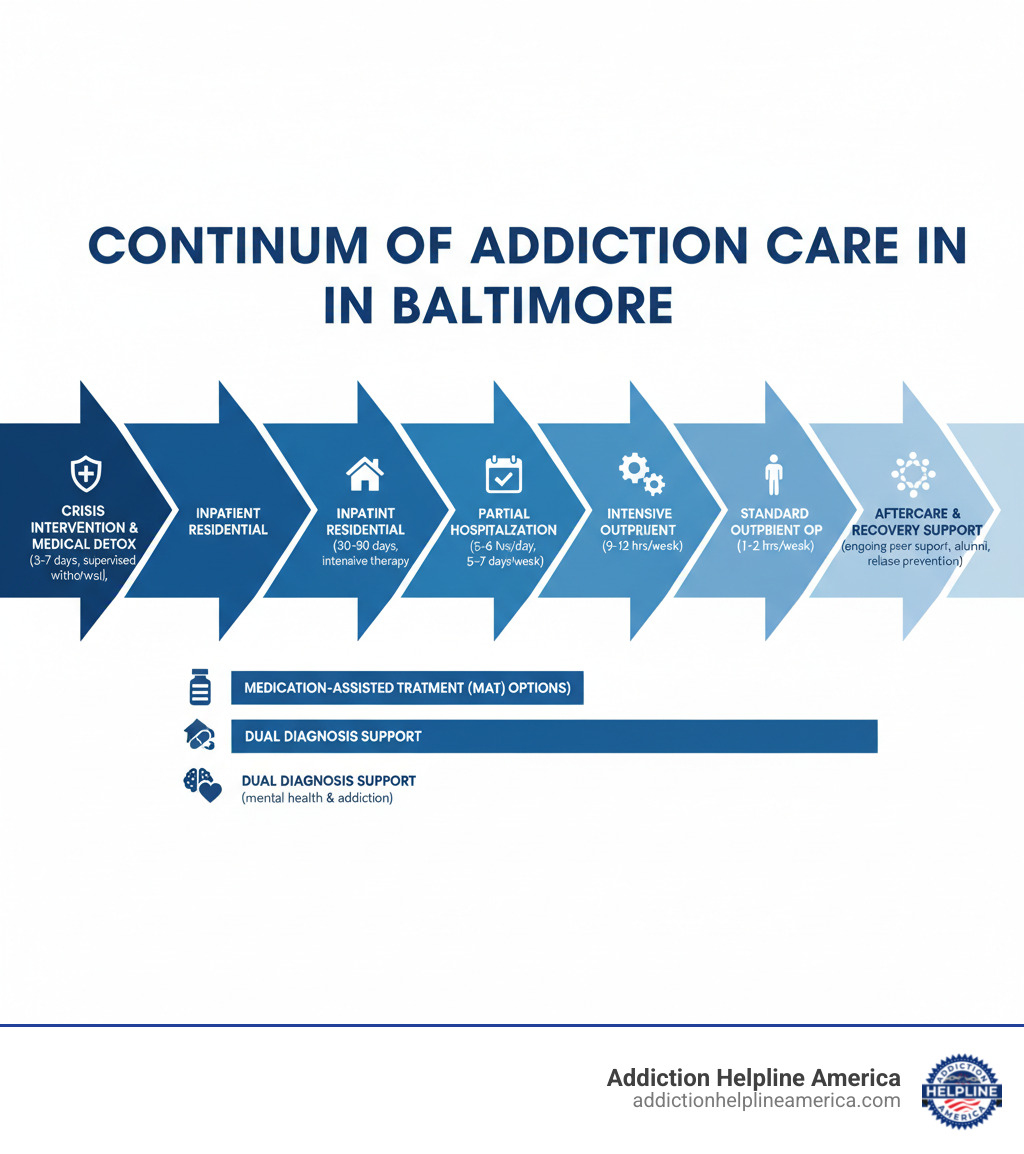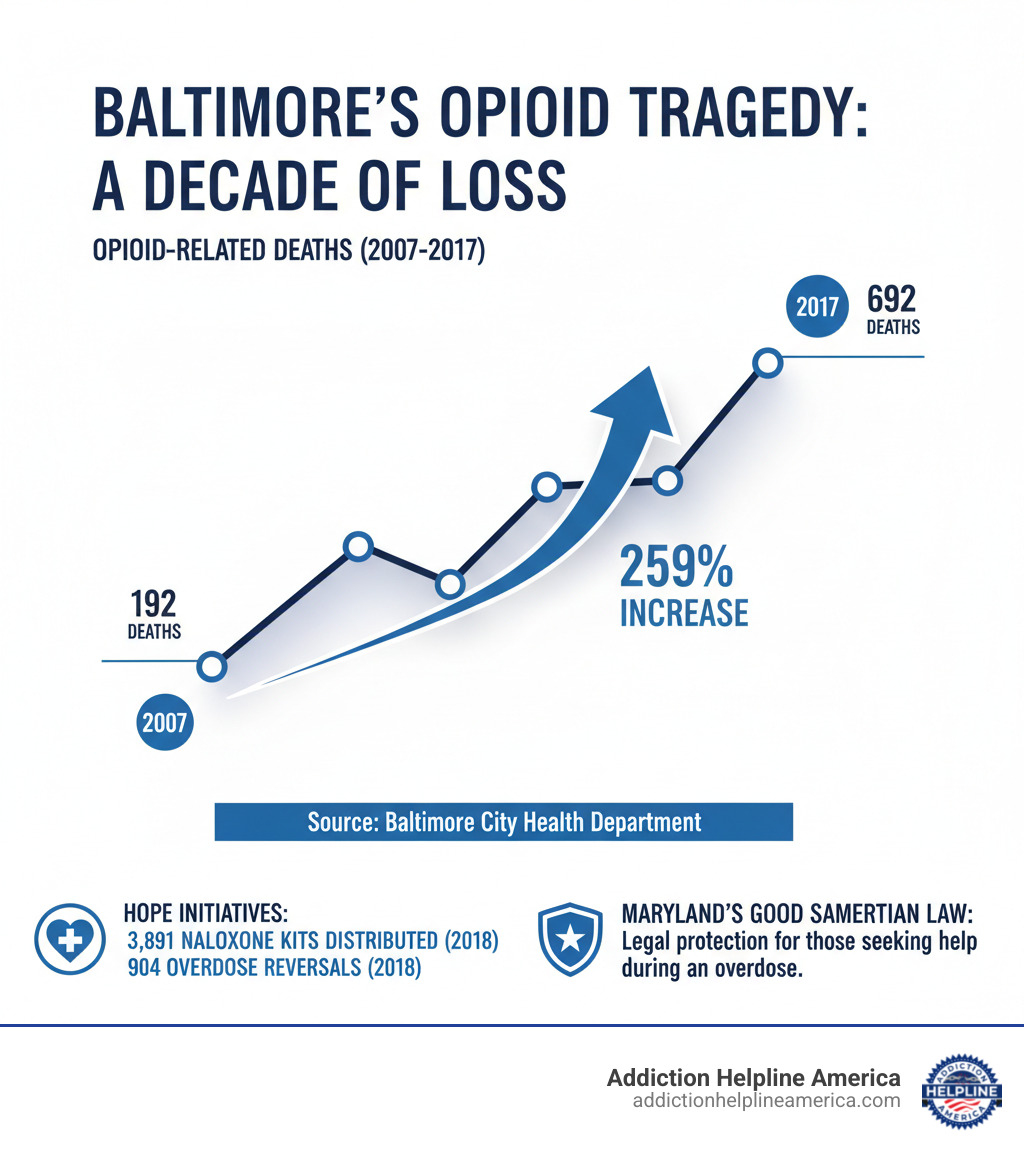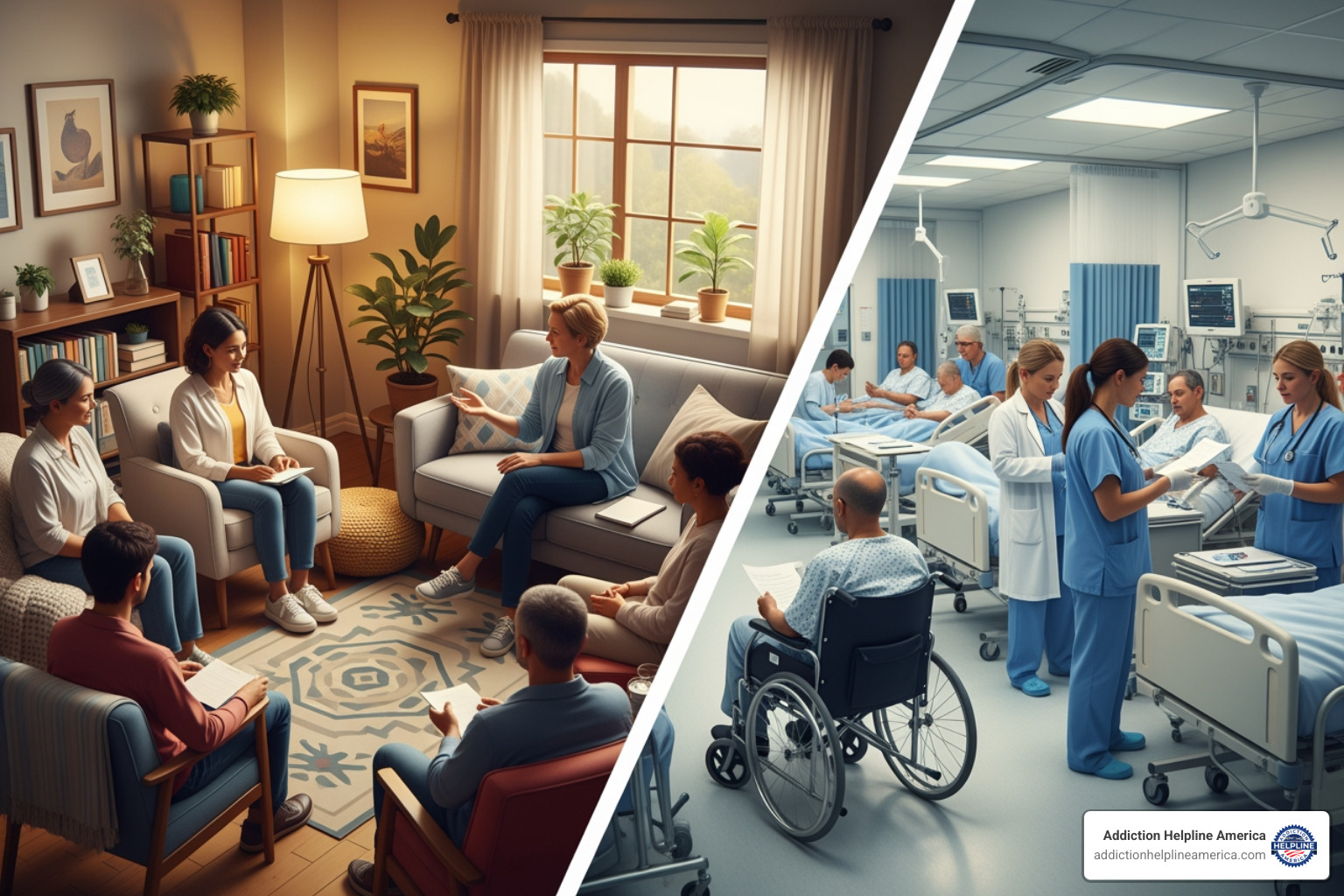
Why Finding the Right Drug Rehab Centers in Baltimore Can Save a Life
Drug rehab centers in Baltimore provide a spectrum of care for substance use disorders, including medical detox, inpatient, outpatient, and medication-assisted treatment (MAT). They offer specialized programs for opioid and alcohol addiction, co-occurring mental health disorders, and diverse groups like veterans, teens, LGBTQ+ individuals, and those experiencing homelessness.
Quick Answer: Types of Drug Rehab Centers in Baltimore
- Medical Detox Centers – 24-hour supervised withdrawal management
- Inpatient/Residential Treatment – Intensive, round-the-clock care in a structured environment
- Outpatient Programs (OP) – Flexible treatment while living at home
- Intensive Outpatient Programs (IOP) – Multiple sessions per week without residential stay
- Partial Hospitalization Programs (PHP) – Day treatment with evening return home
- Medication-Assisted Treatment (MAT) – Combines FDA-approved medications with counseling
- Dual Diagnosis Programs – Treats both addiction and mental health disorders simultaneously
Baltimore faces a severe addiction crisis. In 2017 alone, the city recorded 761 drug and alcohol-related intoxication deaths, with 692 of those involving opioids. The overdose rate increased by 225% between 2007 and 2016. Yet hope exists—Baltimore distributed 3,891 Naloxone kits in 2018 and reversed 904 overdoses through the Staying Alive program.
Finding the right treatment program is the first step to recovery. Baltimore has over 200 accredited rehab centers with varied care levels. Payment options are flexible, including private insurance, Medicaid, Medicare, sliding scale fees, and free programs for those without financial resources.
Addiction Helpline America guides individuals and families in finding drug rehab centers in Baltimore that fit their unique needs. Our team offers 24/7 compassionate support, connecting callers to vital resources as they take the first step toward recovery.
Drug rehab centers in baltimore terms explained:
The State of Addiction in Baltimore: Statistics and City Response
Baltimore, a city of resilience, has been hit hard by the opioid epidemic. The statistics reveal a sobering story affecting families, neighborhoods, and lives.
In 2017, Baltimore saw 761 drug and alcohol-related deaths, 692 involving opioids. From 2007 to 2016, overdose rates surged by 225%. The crisis has evolved beyond heroin, with deadly fentanyl and the tranquilizer xylazine creating new dangers that Naloxone can’t always reverse.
The crisis also affects youth: half of Baltimore teens have used alcohol, and one in eight reports binge drinking. Drug rehab centers in Baltimore are working to reach people of all ages to offer a chance at a healthy future.
Baltimore is fighting back. The City Health Department’s Staying Alive program focuses on distributing Naloxone, the overdose reversal drug. In 2018, the city gave out 3,891 kits and reversed 904 overdoses, giving 904 people a second chance.
Maryland’s Good Samaritan Law protects those who call 911 during an overdose from certain drug charges. This law encourages people to seek help without fear of arrest, prioritizing saving lives.
However, progress is uneven. A 2019 Maryland law requires jails to offer medication-assisted treatment to inmates, a high-risk group. Yet, as of 2023, many facilities haven’t implemented these programs, sometimes due to personal beliefs over medical evidence, leaving a vulnerable population without care.
Despite setbacks, Baltimore’s community health initiatives persist. Drug rehab centers in Baltimore collaborate with public health programs, peer support groups, and community organizations to create a safety net for those seeking recovery.
Recovery is possible, even in a city facing such enormous challenges. The resources exist. The treatments work. And every day, people are finding their way to hope and healing.
Understanding the Types of Drug Rehab Programs in Baltimore
Recovery is a personal journey, so drug rehab centers in Baltimore offer a wide range of treatment options. This continuum of care spans from intensive medical support to independent recovery maintenance.
Addiction Helpline America helps people steer these choices. Figuring out the right level of care can be overwhelming, so let’s break down the options.
Medical detoxification is often the first step, especially for heavy opioid, alcohol, or benzodiazepine use. Abruptly stopping can be dangerous, so medical detox provides 24-hour supervised care to manage withdrawal symptoms. For example, Powell Recovery Center in Baltimore offers withdrawal management for substances including fentanyl and xylazine, showing how centers adapt to new drug threats.
After detox, inpatient residential treatment offers a structured, trigger-free environment. Clients live at the facility for 30 to 90 days, receiving intensive therapy. Maryland Treatment Centers uses a “family healing” approach, creating a supportive community for those feeling isolated by addiction.
For those who can’t commit to residential care, outpatient programs (OP) are an option. OP allows you to live at home and continue work or school while attending therapy a few hours weekly. It’s ideal for individuals with a stable home life and strong support system.
Intensive outpatient programs (IOP) offer more structure. While living at home, you attend treatment for 9 to 12 hours per week. IOP provides more support than standard outpatient care, facilitating gradual reintegration into daily life.
Partial hospitalization programs (PHP), or “day treatment,” are the most intensive outpatient option. Participants spend 5-6 hours daily at the center, 5-7 days a week, receiving therapy before returning home. TruHealing Baltimore offers PHP as a bridge between inpatient and outpatient care.
Matching the right level of care to your needs is key. Addiction Helpline America provides judgment-free guidance to help you make this choice.
The Critical Role of Medication-Assisted Treatment (MAT)
Medication-assisted treatment (MAT) has transformed recovery for opioid and alcohol use disorders. It combines FDA-approved medications with counseling. The medications reduce cravings and withdrawal symptoms, stabilizing brain chemistry. This allows individuals to focus on therapy and rebuilding their lives.
Drug rehab centers in Baltimore widely use MAT. The University of Maryland Addiction Treatment Programs offers buprenorphine, methadone, and naltrexone (Vivitrol). Johns Hopkins Broadway Center for Addiction provides similar medications for opioid treatment and disulfiram for alcohol dependence.
Buprenorphine (Suboxone) reduces cravings without a high. Methadone is similar but requires daily clinic visits. Naltrexone (Vivitrol) blocks opioid effects, preventing euphoria upon relapse. The choice of medication depends on individual needs.
Evidence shows MAT reduces overdose deaths and improves treatment retention. With the fentanyl crisis in Baltimore, MAT is a crucial life-saving intervention. You can find more info about Concerted Care Group’s MAT services to see how centers integrate it with therapy.
Treating Co-Occurring Disorders: The Dual Diagnosis Approach
Addiction often co-occurs with mental health conditions like depression, anxiety, or PTSD. This is called a dual diagnosis and requires a specialized treatment approach. The integrated care model addresses both the addiction and the underlying mental health issue simultaneously, with the same team.
Many drug rehab centers in Baltimore specialize in dual diagnosis. TruHealing Baltimore uses therapies like CBT and trauma-focused counseling to treat intertwined addiction and mental health issues, which is vital for those self-medicating emotional pain.
Scientific studies on dual diagnosis confirm that integrated treatment yields better outcomes than separate treatments. Coordinated care for both addiction and mental health increases the likelihood of lasting recovery.
For complex cases, facilities like the Neuropsychiatry Institute at Good Samaritan Hospital provide comprehensive psychiatric and addiction services. They focus on healing the whole person for sustainable change.
Addiction Helpline America asks about mental health to find comprehensive treatment, as true recovery addresses all underlying issues.
Specialized Treatment Programs for Diverse Needs
Recovery paths are unique, so the best drug rehab centers in Baltimore offer personalized treatment that honors individual backgrounds, challenges, and strengths. Finding a program that understands your specific situation—whether you’re a veteran, a teen, or part of an overlooked community—is crucial. Baltimore’s treatment landscape offers specialized programs that provide the custom support needed for lasting recovery.
Programs for Veterans
Veterans deserve specialized care for their unique struggles. Issues like combat exposure and transitioning to civilian life can contribute to substance use disorders, often co-occurring with PTSD and depression. Baltimore offers dedicated resources for veterans. The Baltimore Station provides a free residential program, removing financial barriers. The Baltimore VA Medical Center and Loch Raven VA Medical Center offer inpatient and outpatient services custom to veterans, addressing both addiction and the underlying wounds of service.
Support for Adolescents and Young Adults
Sobering statistics show half of Baltimore teens have used alcohol, and one in eight binge drinks, putting their futures at risk. Adolescents require specialized treatment that addresses their unique pressures. These programs use age-appropriate therapies, emphasize family involvement for household healing, and include educational components to build life skills. Mountain Manor Outpatient Services offers such care, working with families to help young people thrive in recovery.
Inclusive Care for Specific Communities
Culturally competent, inclusive care is essential for effective treatment, and Baltimore’s drug rehab centers in Baltimore are increasingly providing it.
- LGBTQ+ Individuals: Affirming care is vital. Chase Brexton Health Care – Mt. Vernon Center specializes in providing a safe, non-judgmental space for this community to heal.
- Deaf and Hard-of-Hearing Community: The University of Maryland Addiction Treatment Center’s DASAM program addresses barriers with staff fluent in ASL, offering services to all regardless of ability to pay.
- Women in Recovery: Women have distinct needs, including trauma histories and childcare. Martha’s Place offers specialized programs, and the Johns Hopkins Broadway Center for Addiction runs Wilson House, a halfway house for women.
- Individuals Experiencing Homelessness: Organizations like The Baltimore Station – Baker Street and Health Care for the Homeless offer integrated support for both immediate needs and long-term recovery.
Addiction Helpline America helps you find a program that fits your circumstances. Honoring your identity and experiences makes recovery sustainable.
How to Pay for Rehab: Costs, Insurance, and Free Options in Baltimore
Cost is a major concern during an addiction crisis. For many Baltimore families, the price of rehab seems like an impossible barrier. The average cost of rehab in Baltimore is about $55,020, but this varies widely. A short detox is cheaper than a 90-day inpatient stay, outpatient care is more affordable than residential, and amenities affect the price.
The good news is that financial barriers are often manageable. Baltimore has a robust network of payment options, including private insurance and free programs, to ensure access to care.
Using Insurance, Medicaid, and Medicare
Health insurance likely covers at least part of your treatment. Most drug rehab centers in Baltimore accept major private insurance like Aetna, Cigna, and Blue Cross Blue Shield, giving you many program options.
If you lack private insurance, Maryland Medicaid covers addiction treatment at many Baltimore facilities for low-income individuals. Medicare also provides coverage, especially for older adults and those with disabilities. Maryland’s state-financed health insurance plans also help cover costs.
Verifying your benefits beforehand is key. Insurance policies are complex, but Addiction Helpline America can help. We verify coverage, explain benefits, and connect you with in-network providers to reduce costs. Facilities like Kolmac Outpatient Recovery Centers accept multiple plans, increasing accessibility.
Finding Free or Low-Cost Drug Rehab Centers in Baltimore
If you have no insurance or can’t afford costs, Baltimore’s commitment to community health provides options.
- State-funded facilities offer evidence-based treatment at little to no cost for eligible Maryland residents.
- Non-profit organizations are vital. For instance, the publicly funded Johns Hopkins Broadway Center for Addiction serves residents regardless of their ability to pay.
- Many drug rehab centers in Baltimore use sliding scale fees, basing costs on your income.
- Grants and scholarships from organizations and centers can also help cover costs.
- For veterans, The Baltimore Station provides completely free residential programs.
Community resources like local health centers, the City Health Department, and the University of Maryland Addiction Treatment Center can guide you to these affordable options.
The bottom line: help is available. The cost of addiction is far greater than the cost of treatment, and Baltimore offers payment options for every situation.
Finding the Best Drug Rehab Centers in Baltimore for Your Needs
Choosing a treatment center is a critical decision in your recovery journey that requires careful consideration. At Addiction Helpline America, we know the “best” rehab center isn’t about fancy amenities, but about fitting your unique situation and goals.
A personalized assessment is key to finding the right fit. Factors like substance use history, mental health, family, and work obligations matter. Personal preferences for 12-step, holistic, or faith-based programs are also important. For example, Maryland Treatment Centers’ “family healing” philosophy may appeal to some but not all.
Location and accessibility are crucial for treatment commitment. For outpatient care, consider practicalities like public transit access (e.g., The University of Maryland Addiction Treatment Programs is on a bus line) and parking. Ensure you can realistically attend sessions while managing other responsibilities.
Specialized care may be necessary for your unique needs. Whether you’re a veteran with PTSD, a teen, or an LGBTQ+ individual, finding a custom program is important. Huber and Associates Counseling offers individualized guidance to find drug rehab centers in Baltimore that understand your experience.
What to Look for in Drug Rehab Centers in Baltimore
After narrowing your options, check for these quality indicators to ensure you choose a facility that offers the best chance for lasting recovery.
- Accreditation and Licensing: Look for accreditations from The Joint Commission (JCAHO), CARF, or SAMHSA, and licensing from the State of Maryland. These credentials signify adherence to high standards. Johns Hopkins Broadway Center for Addiction, for example, is accredited and licensed.
- Evidence-Based Therapies: Ensure the program uses scientifically proven methods like CBT, DBT, and motivational interviewing. TruHealing Baltimore, for example, focuses on evidence-based methods that research shows are effective.
- Staff Credentials: Inquire about the qualifications of the care team. Are they board-certified specialists or licensed therapists? The University of Maryland Addiction Treatment Programs, for instance, employs addiction specialists and experienced counselors.
- Aftercare Planning: A quality center provides relapse prevention strategies and comprehensive aftercare. Johns Hopkins Broadway Center for Addiction, for example, offers discharge planning and naloxone education for ongoing support.
- Patient Reviews and Outcomes: Patient reviews and published outcomes provide insight. While individual experiences vary, review patterns can be informative. Centers like Ashley Treatment Center publish their outcomes, showing transparency.
Addiction Helpline America can help you steer these factors and connect you with drug rehab centers in Baltimore that meet these criteria and fit your needs. Finding the right fit is about finding a supportive place to heal.
Frequently Asked Questions about Baltimore Rehab
Seeking help for addiction raises many questions. Addiction Helpline America has helped thousands steer these concerns. Here are answers to common questions about drug rehab centers in Baltimore.
What should I do in a substance abuse crisis in Baltimore?
If someone is overdosing or in immediate danger, call 911 immediately. Every second counts. For non-life-threatening urgent situations, contact Baltimore Crisis Response for immediate support and guidance.
It’s vital to know that Naloxone (Narcan) can reverse an opioid overdose. Baltimore’s “Staying Alive” program distributes these life-saving kits. If you or a loved one uses opioids, having Naloxone on hand is critical.
Don’t let fear of legal trouble prevent you from calling for help. Maryland’s Good Samaritan Law protects you from certain drug charges when reporting an overdose. The goal is to save lives.
Can I lose my job for going to rehab?
Fear of losing your job shouldn’t stop you from getting help. Federal laws protect your livelihood when you seek treatment.
The Family and Medical Leave Act (FMLA) allows eligible employees to take up to 12 weeks of unpaid, job-protected leave for addiction treatment. Maryland provides specific information on FMLA protections.
The Americans with Disabilities Act (ADA) also offers protection. Addiction can be considered a disability, meaning employers cannot discriminate against you for seeking treatment and must provide reasonable accommodations.
Strict confidentiality laws (42 CFR Part 2) protect your treatment records. Your employer cannot access them without your written consent, ensuring your privacy. While workplace policies vary, don’t let job fears prevent you from seeking life-saving help.
How do I start the admission process?
Taking the first step can feel daunting, but the admission process is more straightforward than you might think. We can guide you through it.
- Confidential Phone Call: The process begins with a judgment-free phone call to a center or Addiction Helpline America to discuss your situation and needs.
- Confidential Assessment: An assessment helps the center understand your history and needs to match you with the right level of care.
- Insurance Verification: We or the center will check your insurance coverage, costs, and network status to clarify the financial aspect.
- Intake Coordination: Finally, the center sets a start date and provides details. Some drug rehab centers in Baltimore, like Powell Recovery Center, offer immediate admission, while others, like the University of Maryland Addiction Treatment Programs, suggest calling ahead.
The admission process can feel overwhelming, but you’re not alone. We’re here to guide you through each step and ensure you get the help you need.
Get Personalized Drug Rehab Support in Baltimore
Recovery is happening daily in Baltimore. This guide has covered the landscape of drug rehab centers in Baltimore, from crisis response to aftercare. The city offers a full spectrum of care, including detox, inpatient, outpatient, and specialized programs for diverse groups and those with co-occurring disorders.
We’ve covered how Medication-Assisted Treatment (MAT) and dual diagnosis programs support lasting recovery by addressing cravings and co-occurring mental health conditions. We’ve also shown how various payment options, from insurance to free programs, make treatment accessible.
While the statistics are sobering, Baltimore has responded with determination by distributing Naloxone, enacting the Good Samaritan Law, and building a network of accredited treatment centers staffed by compassionate professionals.
Taking the first step is the hardest part. It’s normal to have concerns about treatment effectiveness, cost, and choosing the right program. Addiction Helpline America offers 24/7 personalized, confidential guidance to connect you with drug rehab centers in Baltimore that fit your needs.
You don’t have to do this alone. We’re here to listen without judgment and guide you to resources that can make a real difference. Recovery begins with reaching out.
Our helpline is 100%
free & confidential
If you or someone you care about is struggling with drug or alcohol addiction, we can help you explore your recovery options. Don’t face this challenge alone—seek support from us.
Programs
Resources
Will my insurance
cover addiction
treatment?
We're ready to help
Find the best
drug or alcohol treatment
center
Are you or a loved one struggling with addiction? Call today to speak to a treatment expert.

















